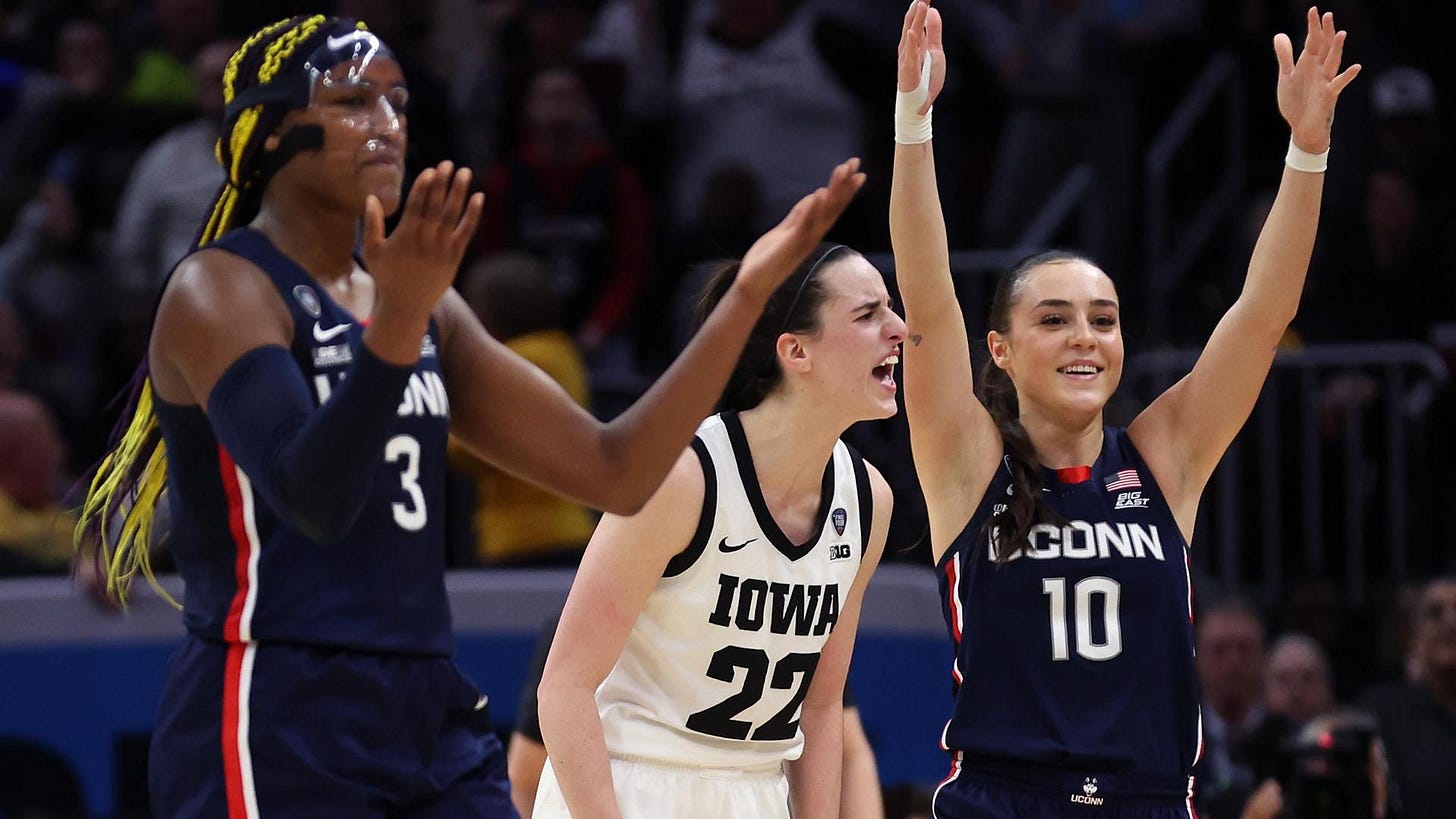Canzano: Thrill of victory and agony of a late whistle
A deep dive on the final seconds.
The final seconds of Iowa’s victory over UConn in the women’s Final Four semifinal on Friday ignited an officiating debate and set off a string of conspiracy theories.
Blow the whistle in that late-game situation?
Or swallow it?
The Huskies were called for an illegal screen on their final possession. The Hawkeyes won the game 71-69. And the episode eventually made my mind wander to the U.S. Army Corps of Engineers and Oregon football coach Dan Lanning.
More on that stuff in a moment. Because I went to sleep on Friday night wondering whether a foul called on a late-game possession has more impact than one whistled early in the game. It certainly felt that way to UConn coach Geno Auriemma, who noted in the post-game news conference: “There’s probably an illegal screen call that you could make on every single possession.”
After the game, I received a bunch of notes from readers. One read: “If it’s a foul in the first quarter it’s a foul in the fourth.” Another offered: “Situation doesn’t dictate whether it’s a foul. The fact that it was a foul does.” And a third wrote: “The networks had to love it.”
ESPN and ABC were among the winners on Friday. The worldwide leader is going to post a fun rating number for the semifinal. And ABC will enjoy another jackpot audience for Sunday’s national title game featuring Caitlin Clark vs. undefeated South Carolina. The Gamecocks look poised to mop the hardwood floor with Iowa, but the broadcast is going to break records and be held up as proof of how far the women’s game has evolved.
I don’t need the TV numbers. I’d argue that the fact we’re all tuned in and fired up over the Iowa-UConn controversy is proof enough. The women’s tournament not only gave us Friday’s illegal-screen debate, but also ignited passionate conversations over an inaccurate 3-point line, a nose ring, and an official who was forced to recuse herself at halftime of a game because of a conflict of interest.
As long-time Portland television news anchor Pete Ferryman tweeted at me on Friday night: “Controversy = Currency in an attention economy.”
I mostly agree with Auriemma. Let the players play. In the closing seconds, I want to see UConn make (or miss) a game-winner. Or watch Iowa dig deep on a tremendous defensive play to win the game. I’m there for the athleticism, strategy, emotion, and 10 players on the court deciding the outcome. I didn’t care who won, necessarily. But what I got instead was a jarring late-game whistle that left me feeling flat.
We’re taught in elementary school that sequence matters. The order of events is important to telling stories. The order of operations matters in solving math equations. And you put your socks on before your shoes, I hope. But is the impact of a play or call that happens in the early part of a sporting event the same or much different than one that occurs in the closing seconds?
Oregon football coach Dan Lanning went for it on fourth down and short vs. kicking a couple of field goals against Washington last season. One field-goal decision came in the first half and one in the second. Also, Lanning unsuccessfully went for it on fourth down late in the game vs. punting.
The Huskies won by three. Lanning got blistered by fans and the media in the aftermath. But I wondered after that loss if those three decisions should be treated equally.
Lanning’s first ‘go-for-it’ came right before halftime at the UW 3-yard line, down by four points. The second came on the second possession of the second half at the Washington 8-yard line. The third came at midfield with two minutes left and Oregon leading by four points.
Some argued that Lanning should have kicked a field goal before halftime. After all, Oregon was getting the ball to start the second half. Others said that it was OK to be more aggressive early in the game because there’s time to recover if you come up empty. But three points is three points. Does it matter when you put it on the board?
Lanning got no points on his first gamble, and then unsuccessfully doubled and tripled down in the second half. He looked like a guy in a casino running to the ATM between bad runs at the blackjack table.
The whole episode ignited a week-long argument about where UO lost that game. By not taking two gimme field goals in the second and third quarters? Or by going for it on that fourth-quarter gamble that gave the ball back to UW’s Michael Penix Jr. for the game-winning drive? Basically, did the order of operations matter on the football field? Is a play, or a decision, or a whistle early in a sporting event really the same as one late in a game? Or different?
That’s where the Army comes in. Years ago I was covering the NFL. The 49ers were headed to Green Bay to play in frigid temperatures. The wind chill was expected to be as low as -15 degrees. In the run-up to the game, a lot was made of the cold-weather success that Packers’ quarterback Brett Favre enjoyed. It was frequently reported that Favre was a high performer in low temperatures, going 39-6 in his first 45 starts when the game-time temperature was below 40 degrees.
The U.S. Army Engineer Research and Development Center studies all sorts of random things. I gave them a call. Turns out they were interested in cold-weather performances themselves. They’d conducted a study to figure out if US soldiers who trained for months in cold weather could build tolerance and be conditioned to perform better in it.
Olympians train at high altitudes for a reason. Red blood cells fuel our muscles. At high elevations, our bodies boost the production of these cells to deliver more energy and oxygen. That positively impacts cardiovascular performance, particularly when we return to normal elevations. But would soldiers who are going to be deployed to freezing destinations perform better if they received their training in the cold? The Army wanted to know.
Turns out that cold-weather training had almost no impact. Over several years, nobody appeared to build tolerance for cold temperatures. However, researchers noted an oddity in the study — select individuals appeared to be less distracted and hindered by frigid conditions. Basically, yes, it’s possible that Favre was wired a little differently. It’s also possible that if the Packers weren’t very good around him nobody would have noticed.
Is the Army up for another study we can apply to sports? One about sequential decision-making and consequence? Decisions early in any sporting event certainly matter. But I’m left thinking about the final seconds of Friday’s Iowa-UConn game. Was the foul called at the end of the game more significant than the ones called in the first half? Or maybe the Huskies only have themselves to blame. They missed some easy shots, blew some defensive assignments, and had a run of third-quarter turnovers. Fix those things and nobody’s talking about an illegal screen.
After Friday’s game, UConn’s Paige Bueckers told the media that the foul call didn’t decide the game. She pointed out several other mistakes, including her own, and said: “Everybody can make a big deal of that one single play, but not one single play wins a basketball game or loses a basketball game.”
I admire her grace. And I’m among those who badly wanted to see her take the game-winning shot attempt. I should also point out that game officials have a thankless job. Sports fans are armed with the benefit of instant replay and multiple camera angles. The officials on Friday had to deal with 19,000 fans, 10 high-level women’s college basketball players moving at full speed, a ticking clock, two head coaches, and loads of scrutiny. I don’t envy that.
In slow motion, it indeed appeared — by the letter of the rulebook — to be an illegal screen. Aaliyah Edwards’ feet were positioned wider than shoulder width. She moved into the path of the defender and leaned in with a shoulder. It’s a foul, right? But Auriemma has a point.
The officials could probably foul both teams out in the first half if they called every screen by the book. And we just watched a Super Bowl in which the game officials could have flagged the Kansas City Chiefs for holding on every pass play and ruined the flow of the game.
A debate like such as this is part of what makes sports great. Because we can apply the logic, lessons, and questions to our daily lives. I make all sorts of decisions in my day. But I’ve never considered whether a choice I make in the morning (or even as a young person) matters the same, or less, or more than one that comes right before closing the book on the day (or as I age). I just go about my day like Forrest Gump, meandering along, doing the best I can in a given moment.
We’ll never know what Auriemma’s team might have done in that final possession. But we do know that UConn had its chances. In the final seconds, Clark missed a free throw. All the Huskies had to do was grab the ball with two hands, advance it to midcourt, and execute a successful play in the final three seconds. But there I go again, focusing on a late rebound. As if that one mattered more than any of the ones that came before it.
I appreciate all who support, subscribe, and share this independent writing endeavor. Please consider a subscription or a gift subscription for a family member or friend:




Illegal screen, all game/every game. That wasn't a remotely marginal screen. You don't make that call you cheat Iowa. Set a better screen. Don't blame the referee that had the courage to make the right call regardless of circumstances. Ask the New Orleans Saints about a ref not having the courage to throw a flag in a key situation. Refs at that level are paid a ton of money to have the guts to make the right call even in the toughest of circumstances. Get the play right... and they did.
I think this one was clearly a foul, and not even that borderline, so they had to call it. Also, UConn might have had another chance if they could have grabbed the rebound when Clark missed the second foul shot. Scanning through Twitter (I don't care what Elon calls it) I was impressed by the number of tweets about this. Man, the women's game has come a long way. I'm not even sure how much of the men's Final Four I'll tune into today, but I know I will be watching tomorrow!